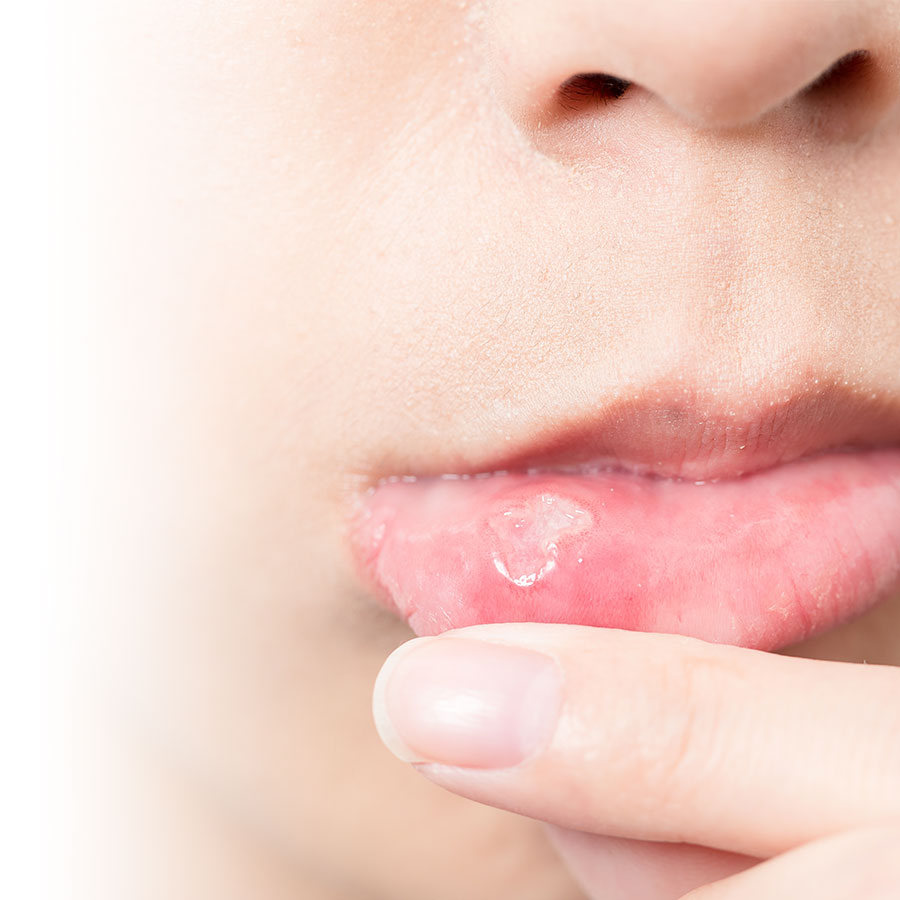Aphthous ulcers (or canker sores) are common and affect people of all ages. Did you know that they can be prevented and relieved?
What are aphthous ulcers?
How do you know if you have a mouth ulcer?
Mouth ulcers are commonly called canker sores.
- They are mostly round or oval, covered with a white or yellow membrane, sometimes grey, with a red area around it.
- They can appear in different areas of the mouth: the tongue, inside the cheek, roof of the mouth or gums.
- They are often painful, cause a burning sensation, and can interfere with eating and hydration.
- Canker sores can vary greatly in size. While some measure just a few millimeters in diameter, others will exceed one centimeter.
How long does it take for a mouth ulcer to heal?
Depending on the type of ulcer, they may appear individually or in clusters. Most of the time, minor mouth ulcers will heal on their own within 7 to 14 days without leaving a scar. Major canker sores (usually larger) can take up to six weeks to heal and may result in scarring.
How do you treat a mouth ulcer?
Canker sores are usually quick and easy to treat. Here's what you can do to help relieve and heal them:
- Rinse your mouth with salt water (one teaspoon of salt in one cup of water).
- Avoid applying salt directly on the mouth ulcer.
- Avoid alcohol-based mouthwashes.
- Limit your intake of spicy, acidic, hard, or sharp foods.
- Continue brushing your teeth and flossing.
- Let an ice cube melt on the ulcer to ease the pain.
- Apply orthodontic wax to limit trauma caused by ill-fitting braces.
Over-the-counter products to relieve mouth ulcers
There are a number of products designed to relieve canker sores available over the counter at the pharmacy: gargles, gels, pastes, patches and more. Some contain anesthetic agents, others help prevent infection, and some cover and protect mouth ulcers. Prescription products are also available for the treatment of mouth ulcers.
When an ulcer causes pain, you can take an acetaminophen- or ibuprofen-based analgesic. Ask your pharmacist which product is best for you, based on your situation, age, health, and any medication you're already taking.
What causes mouth ulcers?
Canker sores can develop for no apparent reason. In some cases, triggering factors can be identified. Here are some examples:
- trauma to the mouth
- stress and anxiety
- hormonal changes
- certain food additives or preservatives
- certain medications (drugs that may be involved include those used to treat cancer, inflammation, hypertension, and heart disease). Your pharmacist can tell you which medications may cause mouth ulcers
- certain health problems
- certain vitamin and mineral deficiencies
Mouth ulcers can affect anyone, but some people are at greater risk. Women are more likely than men to develop them. People under 40, especially children and teenagers, are also at greater risk.
How can mouth ulcers be prevented?
If you know the factors that cause your mouth ulcers, avoid them if possible. You can also adopt certain measures to prevent canker sores. Here are just a few examples:
- Maintain excellent oral hygiene. Use a soft-bristled toothbrush and non-abrasive toothpaste.
- If you wear dentures or braces, make sure they are well fitted.
- Take the time to chew your food well and avoid talking while you eat. This will help prevent accidental mouth biting.
- Be careful when eating foods that can cause canker sores, such as sunflower seeds or peanuts.
- Avoid biting the inside of your mouth. This is a bad habit that predisposes to ulcers.
- Reduce your stress or anxiety levels.
- Practice good sleep hygiene.
- Limit alcohol consumption
When should you see a doctor about a mouth ulcer?
You should see a doctor if you:
- you suffer from mouth ulcers frequently (more than six times a year)
- your ulcers are slow to heal (no improvement after seven days)
- the onset of mouth ulcers is accompanied by other symptoms (diarrhea, red eyes, fever, etc.)
- you have significant difficulty eating and drinking
Speak to your pharmacist to learn more about the treatment and prevention of mouth ulcers.

